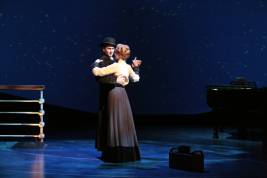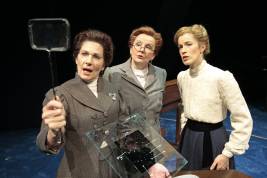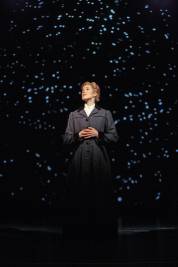
When you think of pioneering names in the field of Astronomy, who pops into your head? Nicolaus Copernicus? Galileo Galilei? Tycho Brahe? Sir Isaac Newton? Johanes Kepler?
Notice anything these five men have in common?
That’s right. There’s not a female name in the bunch, making it all the more extraordinary that Henrietta Leavitt (1868-1921) managed to crack the glass ceiling that separated the men from … well, from the women in the early 20th Century. Gumption, ambition, and smarts proved victorious in the end, however, and the Radcliffe graduate was able to secure employ at the Harvard College Observatory, working her way up the ladder from an entry level job as a “computer” to becoming the first scientist to discover the limitlessness of the universe.
Though Leavitt’s work remained largely unrecognized in her lifetime, the astronomer’s achievements have recently inspired George Johnson’s biography Miss Leavitt’s Stars, and more significantly for theatergoers, Lauren Gunderson’s exquisite new bio-play Silent Sky, now getting a splendid world-premiere production at South Coast Repertory under Anne Justine D’Zmura’s imaginative, nuanced direction.
We first meet “Henry” (Monette Magrath) as she is about to depart from her family home for the heady skies of Harvard, part of observatory head Edward Charles Pickering’s “harem” of lowly assistants, an all-female team whose only responsibility is to name and catalog stars seen through the Harvard Observatory telescope and captured on photographic plates.
Tedious as Henrietta’s work proves to be, this is hardly the adjective to describe Gunderson’s captivating play, whose early scenes are spiced by the oh-so entertaining squabbling of Henrietta’s partners in star-gazing, the imperious Annie Cannon (Colette Kilroy) and the quick-witted Williamina Fleming (Amelia White), the latter a feisty Scot. Meanwhile, romantic potential arrives in the person of Peter Shaw (Nick Toren), Pickering’s brilliant assistant and just the right match for the equally brainy Henrietta, if only he can keep from putting his foot in his mouth, something that seems to happen whenever they meet.
In the great romantic comedy tradition, bickering proves mere foreplay to an attraction neither of them can deny, though circumstances conspire to keep the made-for-each-other couple apart, thereby giving Henrietta reason to despair and audiences an even greater reason to invest in the couple’s reunion and reconciliation.
Still, Silent Sky is far more than your standard romcom (with a dash of Love Story added to up the stakes considerably). There’s also the excitement of scientific discovery, as Henrietta devises the first-ever means of calculating a star’s magnitude, and even more significantly, a method of determining the distance of stars as far as ten million light years away, thereby making it clear for the first time that the universe is infinite, and not merely limited to our own galaxy, as previously thought.
Playwright Gunderson creates real characters whose lives we are drawn into, particularly the plucky Henrietta, brought to luminous life by a never-better Magrath. Kilroy and White are ceaseless delights as Henrietta’s zinger-trading colleagues, who become her friends and her champions. (As a side note, White’s character informs Henrietta that she was given her job when her boss complained that his maid Williamina could do a better job than her inept male predecessor—and she proved him right!) An especially fine Toren is a perfect romantic counterpart to Magrath, dark and dour where she is light and airy, making for some terrific chemistry. The all-around excellent cast is completed by the lovely Erin Cottrell as Margaret, Henrietta’s homebody of a sister, who is proven wrong in her early assertion that the two siblings aren’t the kind to have a lifelong closeness.
Though written, directed, and performed entirely by women (with the exception of Toren), Silent Sky happens to have been brought to gorgeous visual and auditory life by a quintet of male designers. John Iacovelli’s relatively simple yet utterly stunning scenic design revolves and rotates like planets, opening at the rear to reveal night skies full of stars courtesy of John Crawford’s dazzling projections. Lighting designer York Kennedy illuminates Iacovelli’s set exquisitely, Lewis Flinn’s original music further adding to our involvement in Henrietta’s story. David Kay Mickelsen’s detailed period costumes are not only beautifully conceived and realized but reflect the personality of each character. John Glore is dramaturg, Joshua Marchesi production manager, and Chrissy Church stage manager.
Having found Gunderson’s previous Woman-In-Science play Emilie “often a bit too dry and esoteric for my tastes” (a direct quote from my review), I wasn’t expecting to fall in love with Silent Sky, but I did. It helps that in Monette Magrath, Gunderson has found her ideal, irresistible leading lady, and that South Coast Rep has surrounded Magrath with excellent support and superb designs. Still, the play is indeed the thing, and Silent Sky makes for just the right blend of human relationships, science, and romance. If you’re anything like me, its wondrous final tableau will leave you breathless.
South Coast Repertory, 655 Town Center Drive, Costa Mesa.
www.scr.org
–Steven Stanley
April 10, 2011
Photos: Henry DiRocco/SCR





 Since 2007, Steven Stanley's StageSceneLA.com has spotlighted the best in Southern California theater via reviews, interviews, and its annual StageSceneLA Scenies.
Since 2007, Steven Stanley's StageSceneLA.com has spotlighted the best in Southern California theater via reviews, interviews, and its annual StageSceneLA Scenies.







 COPYRIGHT 2024 STEVEN STANLEY :: DESIGN BY
COPYRIGHT 2024 STEVEN STANLEY :: DESIGN BY